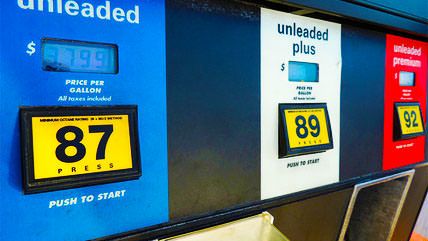Let's Hear It for Price Gouging
Government has no business dictating prices in the first place.

Snow, sleet, and freezing rain weren't the only things to come down last week. So did a weather-related proclamation from Mark Herring. "Attorney General Herring Highlights Price Gouging Protections Ahead of Winter Storm," it read. "Laws protect consumers from 'unconscionable prices' for 'necessary goods and services' during emergencies."
Virginia's Post-Disaster Anti-Price Gouging Act has now been on the books for 10 years — which is 10 years too long. The measure hasn't been used often; Virginia last settled a case in early 2010, regarding an incident from Hurricane Ike in 2008. Still, every time the law is put to use — or even invoked — a few million brain cells die.
That's because so-called price gouging during an emergency serves two very useful purposes: It keeps people from getting too greedy, and it makes strangers rush to help the stricken.
Take one of the price-gouging cases to arise from Hurricane Ike. Bill Stone, the owner of Bucko's Pantry in Radford, Virginia, was accused of gouging customers because he briefly jacked up gasoline prices to as much as $5.99 a gallon. He did that because the supply he got from refueling trucks had dropped 70 percent, and demand was going through the roof.
"Area and state consumers were in what can only be described as panic buying," ran a typical news report at the time. "The crunch at the Wal-Mart and some other local stations began Thursday night as motorists began topping off their tanks and filled cans of gasoline for their personal reserves."
In fact, so many people in the region bought so much gasoline ahead of the storm that many stations ran dry. But Bucko's didn't run out, because during the short time its prices went way up, people bought much less gas there. Bucko's high prices rationed gasoline in a highly efficient manner. If everyone had done the same thing, then consumers wouldn't have hoarded fuel, and there would have been enough to go around for everyone.
Virginia passed its price-gouging law the year after another Hurricane — 2003's Isabel, which slammed into the state hard and caused widespread power outages. Some people had generators, but many didn't. So one enterprising Richmonder bought 18 generators in North Carolina to resell back home through the classified ads. Another man drove down from Buffalo, New York, to sell generators at more than twice their normal price. Jack and Kim Shepherdson drove up from Kentucky to sell generators and chain saws for which they could ask top dollar.
And it was a good thing they did — because many area hardware stores had sold out of generators even before Isabel roared through. The people who bought generators and other equipment from these "speculators" might have groused about gouging, but they still considered themselves better off after making the transaction than before. If they felt otherwise, then they wouldn't buy. That's why every such exchange is, to use a hoary business cliché, a win-win scenario.
Granted, charitable individuals and companies routinely rush supplies to disaster-stricken areas. Indeed, countless volunteer organizations exist for precisely such a purpose, and many more leap to lend aid in the most extreme instances. Such efforts rarely suffice to meet the aggregate need. Hence, high prices — price-gouging — act as a force multiplier by enlisting yet more help from people who are either unmoved by compassion or unable to give help for free. The high prices also give for-profit companies such as hardware stores an incentive to ship goods where they're most needed.
This is Econ 101 for Dummies: Higher prices are a natural response to surging demand. They (a) impede consumption and (b) encourage resupply. Yet Virginia's price-gouging act is written with the assumption that there is some magical line prices shouldn't cross. Below the line, they are simply the result of regular market forces. Above the line, they are "unscrupulous," "artificially inflated," and "exploitative."
Where is that imaginary line? Wherever politicians think it should be. And what makes them capable of making such a judgment? Well — nothing, really.
There's another argument against price-gouging laws that has nothing to do with basic economics and everything to do with fundamental liberty: Government has no business dictating prices in the first place. A proprietor who wants to sell, say, AA batteries for five dollars apiece — or $50 apiece, for that matter — has every right in the world to do so. Just as customers have every right in the world to go someplace else.
Market transactions should be arrived at through mutual consent — not the threat of force. After all, if a proprietor has no right to set his own prices, then what possible right could some third party have to set them for him?


Show Comments (13)